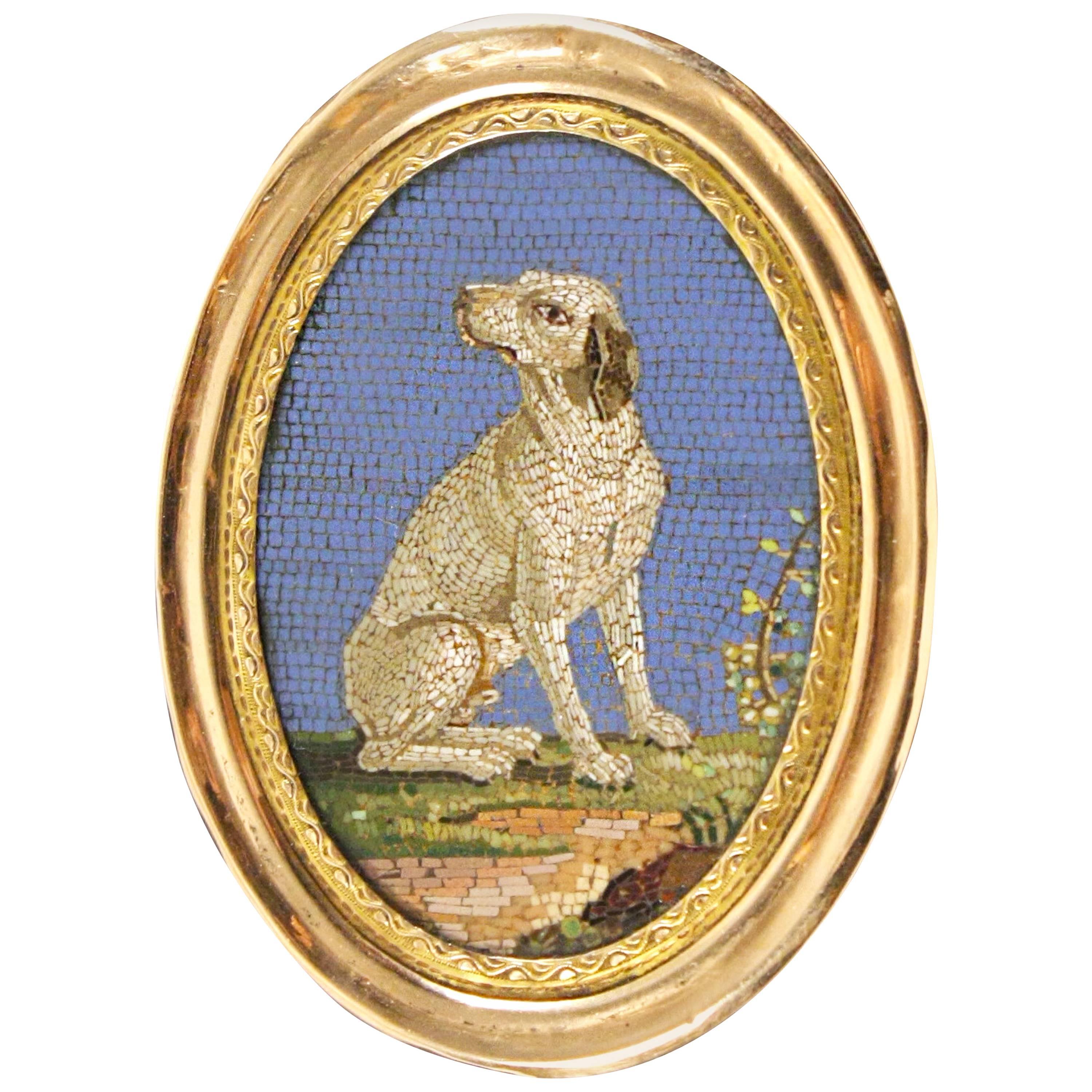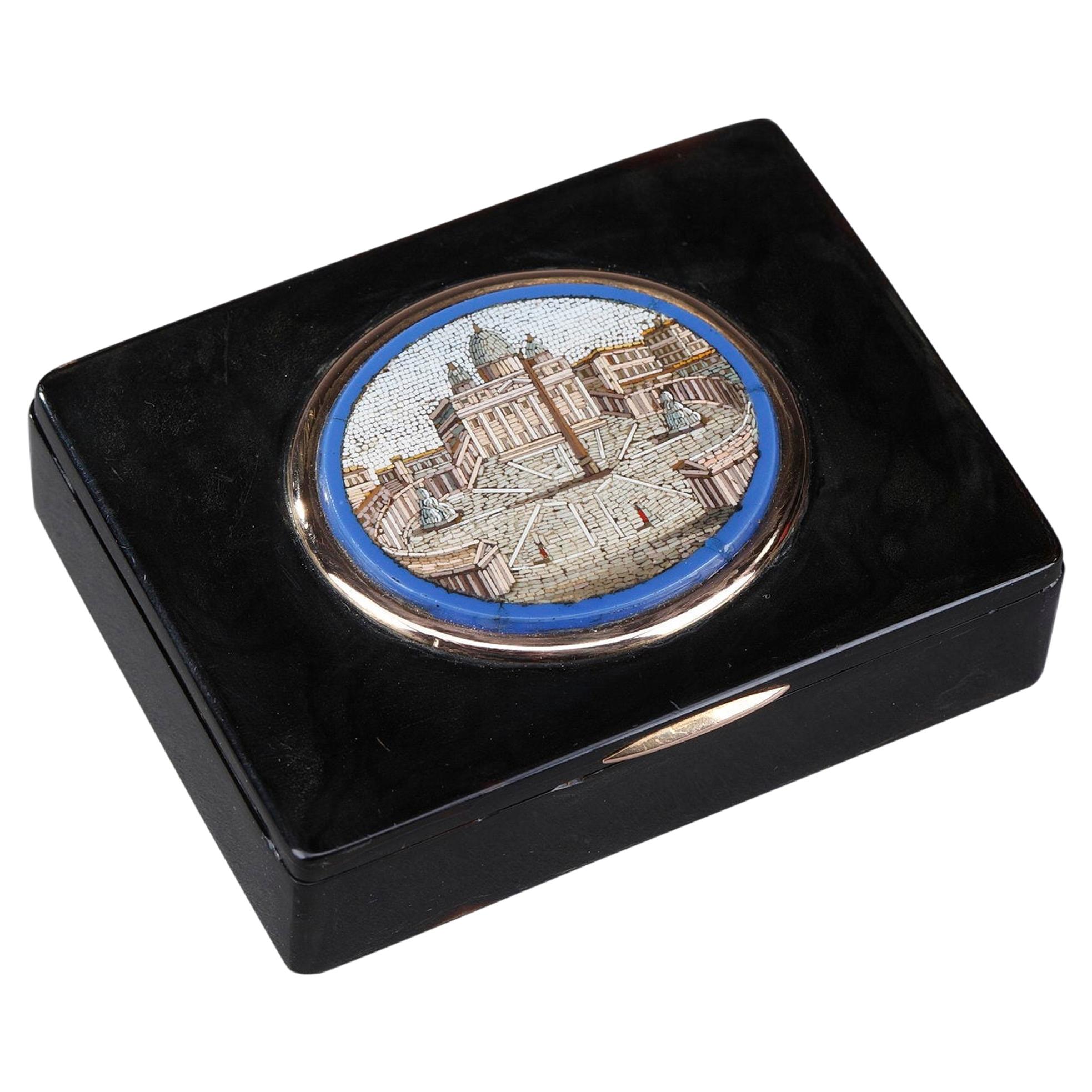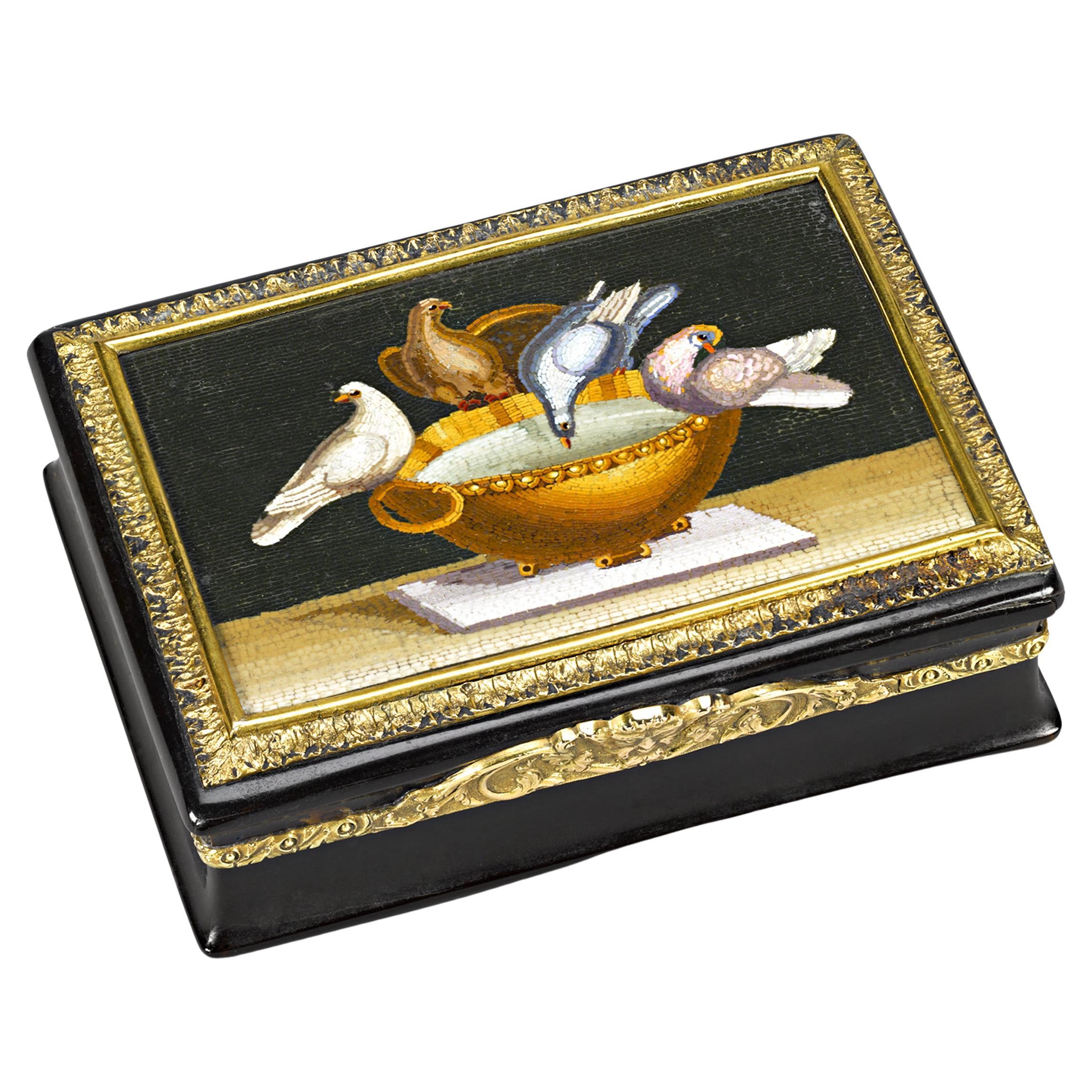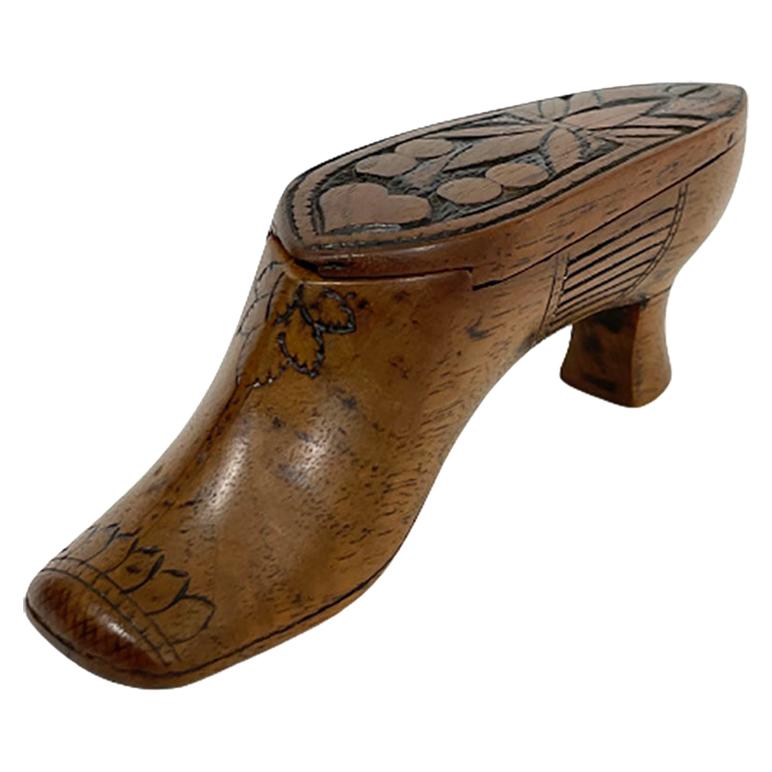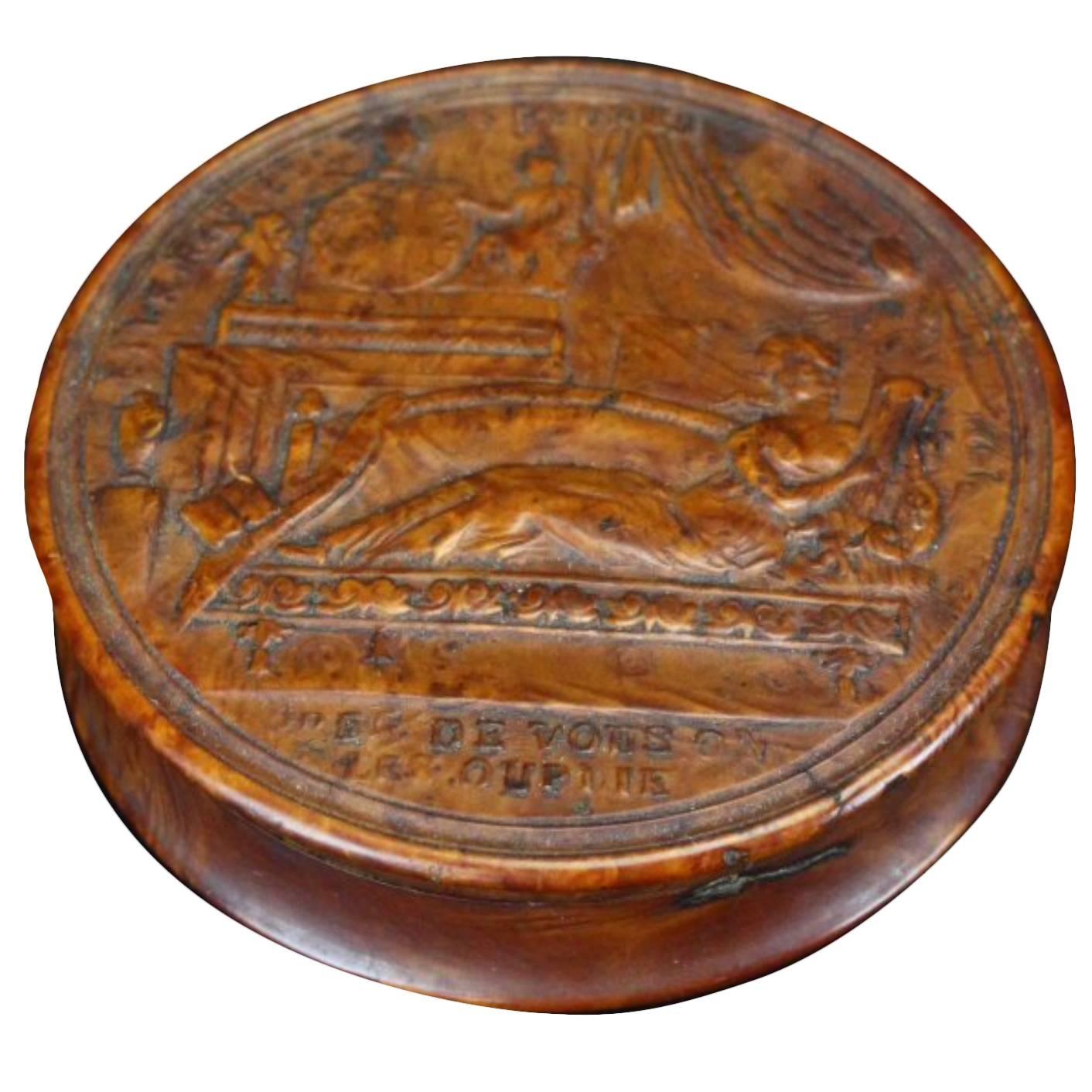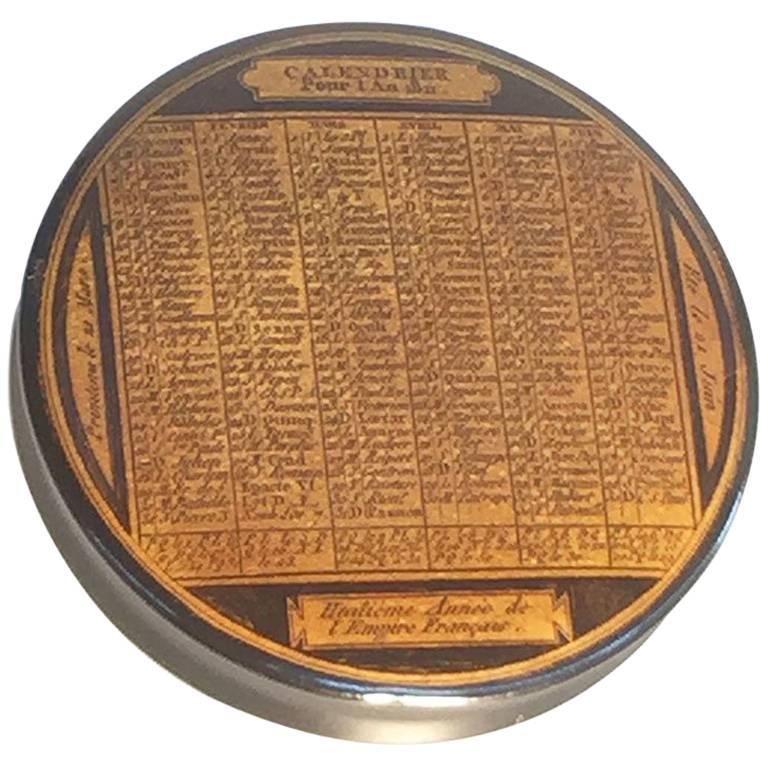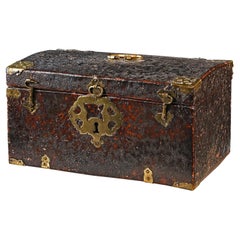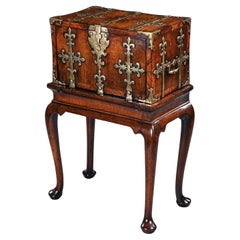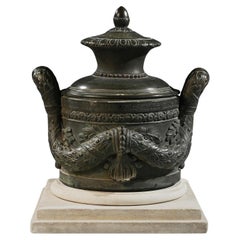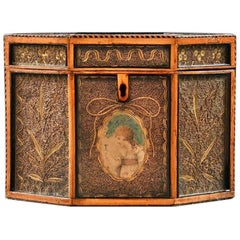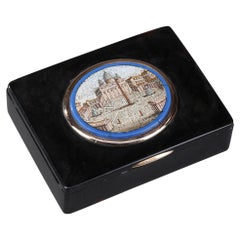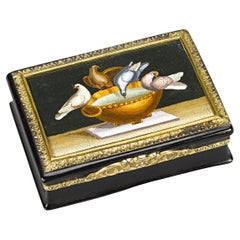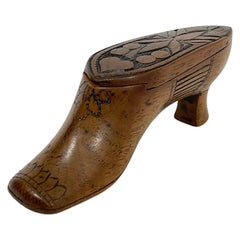Items Similar to Micromosaic Gold Mounted Jasper Snuff Box Early 19th Century Italian Gioacchino
Want more images or videos?
Request additional images or videos from the seller
1 of 11
Micromosaic Gold Mounted Jasper Snuff Box Early 19th Century Italian Gioacchino
About the Item
An Exceptional and Highly Important Micromosaic Gold Mounted Jasper Snuff Box, most probably by Gioacchino Barberi with the box likely by Moulinié, Bautte & Moynier.
Rome & Possibly Geneva circa. 1810
Of green-coloured jasper, mounted in gold, the cover inserted with a micro mosaic panel of the finest quality, worked with a composition of the Capitoline Doves, having a later leather carrying box.
This fine box features a micro mosaic panel of exquisite quality, probably by Gioacchino Barberi of the Barberi workshop in Rome. The panel shows the Capitoline doves, also known as the doves of Pliny. The original Roman mosaic was re-discovered in Hadrian's Villa as part of excavations there in 1737. This is one of the more commonly-encountered panels seen on boxes and other micro mosaic objects but there are several aspects to our panel that make it very rare indeed. As pointed out in Micromosaics: The Gilbert Collection, a summary of the pre-eminent Rosalinde and Sir Arthur Gilbert collection of such pieces currently housed in the Victoria and Albert Museum, it is very rare to find a micro mosaic of this subject that features the reflection of the central dove drinking from the water. Sir Arthur had six versions of this panel mounted on boxes in his collection and even with his exacting standards, only three of these pieces feature the reflection. When looking at micro mosaics in collections more generally, those without Sir Arthur's enormous bank balance behind them, the contrast in numbers is much more marked. Most of the examples that do show the dove's reflection fail to show the ripples in the water caused by the dove's beak breaking the surface and again this fine detail is present in our piece.
A comparison with this box in the Gilbert collection is instructive.
It is always difficult to reproduce curves effectively in this medium and the box in the Gilbert collection is much more blocky-see for example the execution of the mouldings on the base of the bowl from which the doves drink. The Gilbert box features silver gilt mounts and an opaque glass body whereas our piece features gold mounts and a jasper body, further proof that our piece was destined for a truly elite client as the price would have been extremely steep indeed when new.
The Attribution to the Barberi Workshop
Several members of the Barberi family in Rome were involved in the production of micro mosaics. Michaelangelo Barberi seems to have concentrated on large tops produced for furnishing purposes, particularly table tops, but his uncle Gioacchino Leone Ulisse (1782-1857) is recorded as a leading producer of miniature micro mosaic items. The Barberis enjoyed the patronage of an elite clientele of tourists and native consumers, clients including Emperor Napoleon III and countless members of Britain's aristocracy throughout the 19th century. A rare example of a table top made by Gioacchino Barberi was sold at Sotheby's New York 12 April 2011, lot 254. The piece was originally made for Prince Anatole Demidoff.
Gioacchino's workshop was located at 99 Piazza di Spagna and he is believed to have pioneered the use of black enamel smalti, utilised by his firm when reproducing wall paintings from Herculaneum in the micro mosaic technique. A very fine animal subject snuff box by Barberi is illustrated in Jeanette Gabriel, The Gilbert Collection, Micromosaics, 2000, cat. 18. This piece was mounted in a box by A. J. Strachan of London and hallmarked for 1807-1808.
Barberi is known to have entered in to a partnership with the Geneva-based firm of box makers Moulinié, Bautte and Moynier and a small number of boxes by the firm with Barberi micro mosaic plaques survive (see for example one which sold at Sotheby’s London, 10 May 2016, lot 254). Given the outstanding quality of our piece, it is likely to have been one of the joint productions of these two wonderful firms of artisans
- Dimensions:Height: 0.99 in (2.5 cm)Width: 3.35 in (8.5 cm)Depth: 2.56 in (6.5 cm)
- Materials and Techniques:
- Place of Origin:
- Period:
- Date of Manufacture:circa. 1810
- Condition:Wear consistent with age and use. A later leather carrying box.
- Seller Location:Benington, GB
- Reference Number:Seller: 29321stDibs: LU1183235270992
About the Seller
5.0
Vetted Professional Seller
Every seller passes strict standards for authenticity and reliability
Established in 1969
1stDibs seller since 2015
124 sales on 1stDibs
Typical response time: <1 hour
Associations
LAPADA - The Association of Arts & Antiques DealersThe British Antique Dealers' Association
- ShippingRetrieving quote...Shipping from: Benington, United Kingdom
- Return Policy
Authenticity Guarantee
In the unlikely event there’s an issue with an item’s authenticity, contact us within 1 year for a full refund. DetailsMoney-Back Guarantee
If your item is not as described, is damaged in transit, or does not arrive, contact us within 7 days for a full refund. Details24-Hour Cancellation
You have a 24-hour grace period in which to reconsider your purchase, with no questions asked.Vetted Professional Sellers
Our world-class sellers must adhere to strict standards for service and quality, maintaining the integrity of our listings.Price-Match Guarantee
If you find that a seller listed the same item for a lower price elsewhere, we’ll match it.Trusted Global Delivery
Our best-in-class carrier network provides specialized shipping options worldwide, including custom delivery.More From This Seller
View AllLate 17th Century Leather And Brass Travelling Box
Located in Benington, Herts
A very fine and interesting late 17th century English work box or travelling case
English Circa 1680
Of conventional form with slightly domed lid, this piece has acquired a magnifi...
Category
Antique 1680s English Decorative Boxes
Materials
Brass
17th Century William and Mary Period Kingwood Strong Box / Coffre Fort on George
Located in Benington, Herts
An Exceptional 17th Century William and Mary Period Kingwood Strong Box or Coffre Fort of Excellent Colour and Patina on George I Period Walnut Stand
England circa 1690 -1710
Thi...
Category
Antique Early 18th Century English William and Mary Decorative Boxes
Materials
Kingwood, Walnut
Italian 18th C Bronze Locking Vessel With Latin Inscription, Possibly Maritime
Located in Benington, Herts
An Extremely Italian Rare Bronze Locking Vessel With Latin Inscription, Possibly with Maritime Associations.
Italy circa 1780-1820
This very unusual bronze...
Category
Antique Late 18th Century Italian Decorative Boxes
Materials
Bronze
18th Century Georgian Paper Scrolled Quilled Satinwood Tea Caddy
Located in Benington, Herts
A wonderful 18th century George III quill work (scrollwork) tea caddy of hexagon form.
English circa 1790
Finely executed, this very attractive caddy ...
Category
Antique 1790s British Georgian Tea Caddies
Materials
Satinwood
French Thuya And Brass Inlaid Serpentine Cave A Liqueur Or Tantalus Box
Located in Benington, Herts
An Exceptionally Fine French Serpentine and brass marquetry inlaid Cave a Liqueur or Tantalus Box with mother of pearl.
French circa 1870
Primarily veneered in fine thuya wood of...
Category
Antique Late 19th Century French Decorative Boxes
Materials
Serpentine, Brass
Extremely Rare Pair of Regency Cast-Iron Sarcophagus Shaped Strong Boxes
Located in Benington, Herts
An extremely rare pair of Regency cast-iron sarcophagus shaped strong boxes.
Regency, circa 1820
Painted to simulate palisander wood and with parcel-gilt, the cavetto-moulded hinged lids cast with flower sprays above foliate-cast bands over front panels relieved with river gods within canted corners cast with standing muses, the sides with lion mask and ring handles over leafy aprons on massive lion’s paw feet; the Brahmah type lock stamped “T. Davis from London” and impressed with the Royal Crown.
These extraordinary pieces are modelled on Regency wine coolers. The forms are classic Greco-Roman revival with the boat-hook handles, mythic figures and the overall sarcophagus pattern.
You would struggle to find one let alone a pair. Good items for any collection.
Research on going into these strong boxes but we have found possible information on the lock stamped Davis….(historyoflocks )
The relationship of King George III and George Davis of Windsor, who was locksmith in ordinary to His Majesty. Davis, in 1799, invented and patented a unique style of lock, which was also beautifully engraved with a warning not to make duplicate keys. Sensitive government secrets always demanded, then as today, locks that were state of the art. Davis locks ended up on government dispatch boxes...
Category
Antique Early 19th Century English Regency Commodes and Chests of Drawers
Materials
Iron
$21,624 Sale Price
35% Off
You May Also Like
Italian Gold-Mounted Micromosaic Snuff Box
Located in New York, NY
Italian micro mosaic plaque mounted within snuff box, depicting white and brown hound seated on grass.
Circle of Giacomo Raffaelli (1753-1836).
R...
Category
Antique Early 19th Century Italian Snuff Boxes and Tobacco Boxes
Materials
Glass
19th Century Restauration Snuff Box with Micromosaic
Located in Paris, FR
Small rectangular Restauration snuff box crafted in gold. The hinged lid is decorated with an oval micromosaic representing St. Peter's Square in Rome. Micromosaic is set in a gold s...
Category
Antique Early 19th Century French Charles X Tobacco Accessories
Materials
Gold
Micromosaic Snuff Box
Located in New Orleans, LA
This exceptional micromosaic snuff box represents the heights of this ancient art form. Depicting four doves sitting atop a bronze dish, the inse...
Category
Antique 19th Century Neoclassical Snuff Boxes and Tobacco Boxes
Materials
Bronze
$28,500
Dutch Early 19th Century Wooden Shoe Shaped Snuff Box
Located in Delft, NL
Dutch early 19th century wooden shoe shaped snuff box
An early 19th century wooden hand carved snuff box
The lid slides open and closed over the top.
Measures 4 cm high, 12 cm...
Category
Antique Early 19th Century Dutch Snuff Boxes and Tobacco Boxes
Materials
Wood
Empire French Pressed Wood Snuff Box, Early 19th Century
Located in Spencertown, NY
The circular lidded box depicting a woman reclining on a Recamier playing the harp. The underside with a star surrounded by banding with stippling decoration.
Category
Antique Early 19th Century French Empire Snuff Boxes and Tobacco Boxes
Materials
Wood
$960 Sale Price
20% Off
French early 19th Century lacquered papier mâché snuff box
By Stobwasser
Located in Delft, NL
French early 19th Century lacquered papier mâché snuff box
Lacquered Papier Mâché Snuff Box, Calendar 1811, Names of All Saints Per Day. Frenc...
Category
Antique 19th Century French Snuff Boxes and Tobacco Boxes
Materials
Paper
